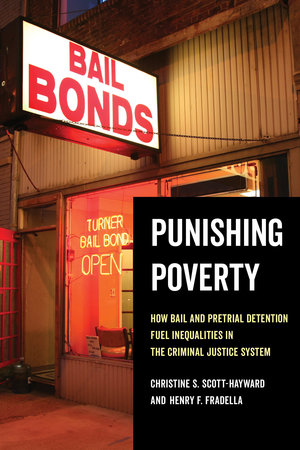This guest post is part of our ASC blog series published in conjunction with the meeting of the American Society of Criminology in San Francisco, CA, November 13-16.
By Christine S. Scott-Hayward and Henry F. Fradella, authors of Punishing Poverty: How Bail and Pretrial Detention Fuel Inequalities in the Criminal Justice System
On any given day, approximately three-quarters of a million people are locked up in America’s jails. Most of them are not there because they are serving a sentence of incarceration after being convicted of a criminal offense. Instead they are in jail because they are awaiting trial or a hearing in their case. And most of them are in jail pending trial, not because there is a risk that they will not show up to their hearing, or because they have been determined to cause a risk to the public: the vast majority are there simply because they cannot afford to pay the money bail that has been set in their case. As we argue in our new book, Punishing Poverty, this situation is unjust. Hundreds of thousands of people are being deprived of their liberty and subjected to often harsh conditions of confinement before they are convicted of the crime with which they are charged. Pretrial detention wreaks havoc with the personal and professional lives of people who are detained, and the burden of pretrial detention is not distributed equally. Poor defendants are the most disadvantaged, and racial and ethnic minorities are more likely to be detained pretrial than white defendants.
The importance of confronting and fixing this system cannot be understated. The inequities inherent in most pretrial justice systems contribute to the larger inequities in the entire criminal justice system, and are a major contributor to mass incarceration in the United States. This is largely because of the “downstream consequences” of pretrial detention. As we explain in more detail in the book, pretrial detention negatively impacts case outcomes: people who are detained while they await trial are more likely to plead guilty, and to do so earlier; as a result, they are more likely to be convicted; they are also more likely to be sentenced to jail or prison (rather than receiving an alternative sentence such as probation or a fine) and to receive a longer sentence.
Jurisdictions around the country have begun to confront and address their pretrial justice systems, but as states like California have found, fixing these broken systems is not easy. Commercial bail agencies typically oppose reform, and judges are not always open to relinquishing their discretion to opaque algorithms in risk assessment instruments. Moreover, many of these tools are flawed for a multiplicity of reasons, ranging from assessing the wrong types of risk to correlating with a number of variables that suggest risk assessments may actually perpetuate—rather than alleviate—racial and ethnic disparities in the criminal justice system. There are, however, steps that can be taken that can reduce pretrial injustice, including the elimination of commercial bail and bail schedules, increased use of unconditional pretrial release, and the use of inexpensive but effective court notification programs.


